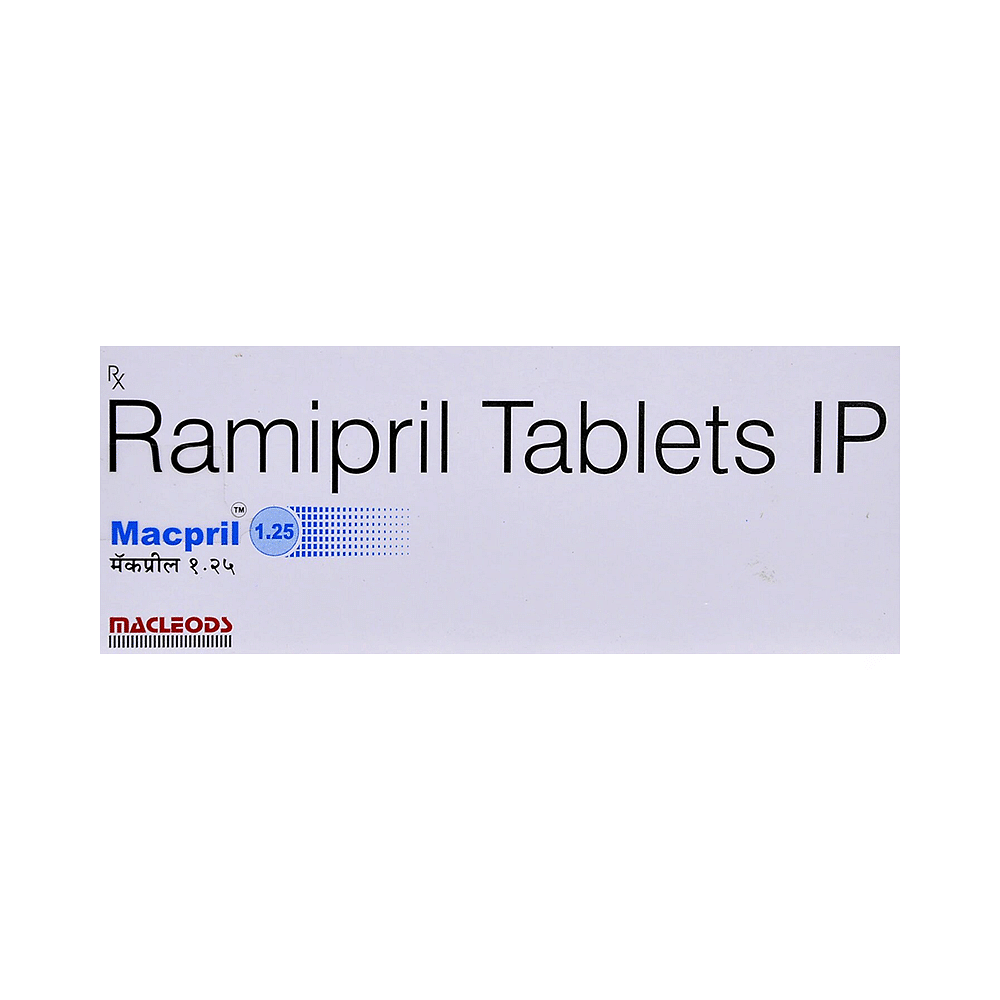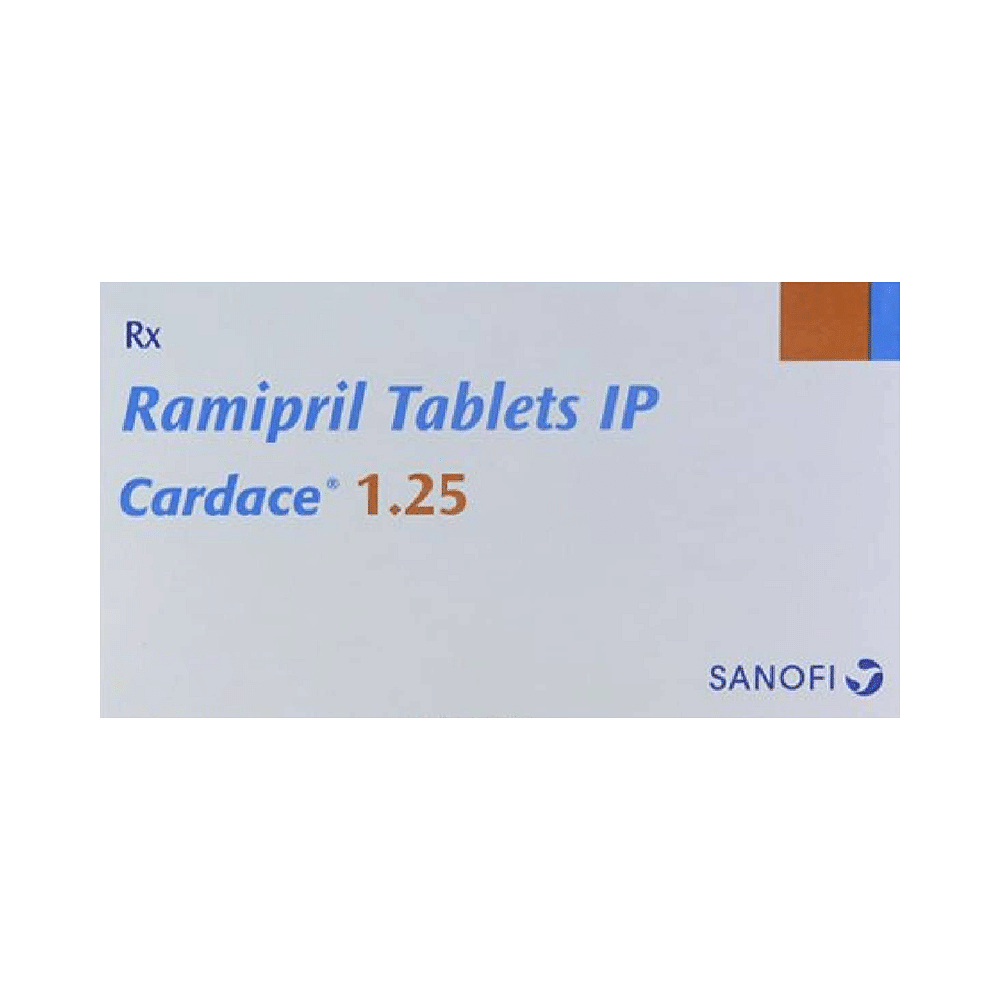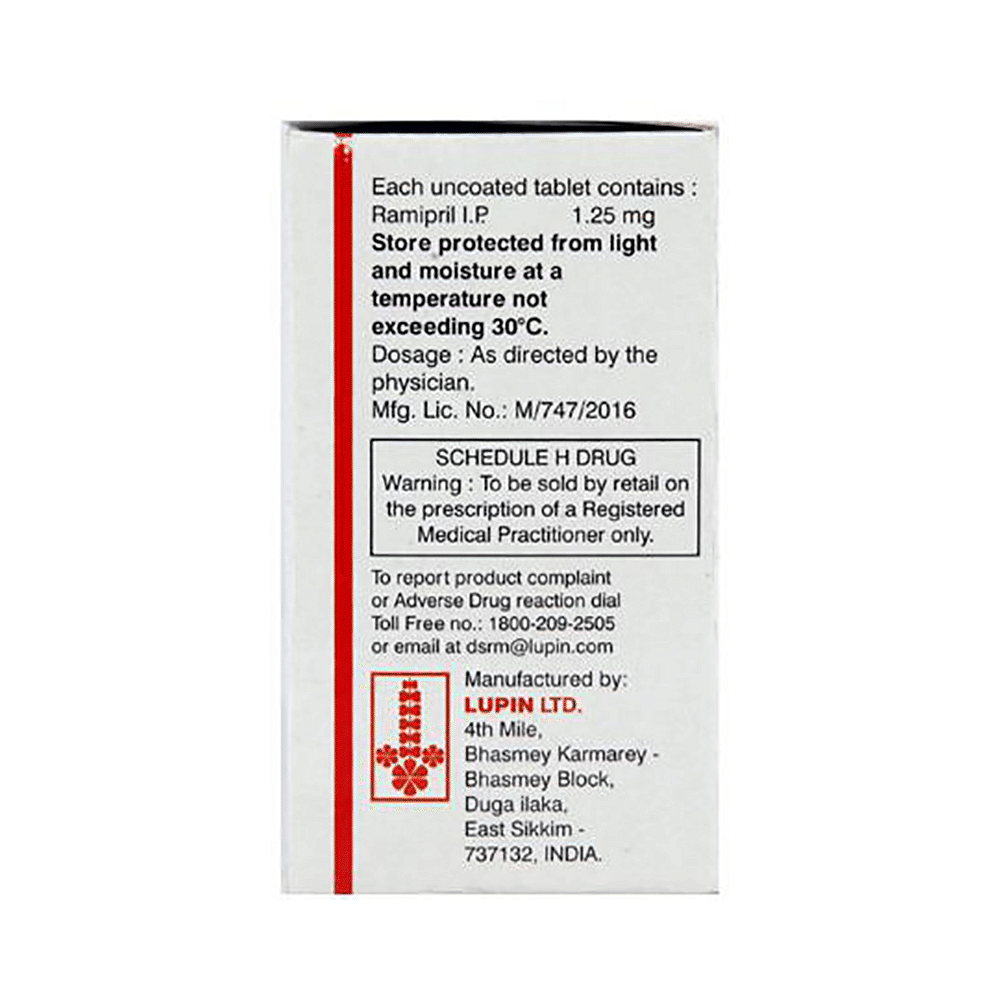
Ramiday 1.25mg Tablet
Manufacturer
Shrinivas Gujarat Laboratories Pvt Ltd
Salt Composition
Ramipril (1.25mg)
Key Information
Short Description
Ramiday 1.25mg Tablet is widely used to treat high blood pressure and heart failure and may even be prescribed after a heart attack. It also lowers the chances of having a heart attack or stroke.
Dosage Form
Tablet
Introduction
Ramiday 1.25mg Tablet may be prescribed either alone or in combination with other medicines. It can be taken on an empty stomach or with a meal. This medicine should preferably be taken at the same time each day to get the maximum benefit. It is important to continue taking it regularly even if you feel well or even if your blood pressure is controlled. Most people with high blood pressure do not feel any symptoms but if you stop taking this medicine your condition could get worse. This is a widely used medicine and is considered safe for long-term use. Making some changes in your lifestyle will also help lower your blood pressure. These may include regular exercise, losing weight, not smoking, reducing alcohol intake, and reducing the amount of salt in your diet as advised by your doctor.
Directions for Use
Take this medicine in the dose and duration as advised by your doctor. Swallow it as a whole. Do not chew, crush or break it. Ramiday 1.25mg Tablet may be taken with or without food but it is better to take it at a fixed time.
Safety Information
Side Effects
No common side effects listed.
Alcohol Warning
Ramiday 1.25mg Tablet may cause excessive drowsiness with alcohol.
Breastfeeding Warning
Ramiday 1.25mg Tablet is probably unsafe to use during breastfeeding. Limited human data suggests that the drug may pass into the breastmilk and harm the baby.
Pregnancy Warning
Ramiday 1.25mg Tablet is unsafe to use during pregnancy as there is definite evidence of risk to the developing baby. However, the doctor may rarely prescribe it in some life-threatening situations if the benefits are more than the potential risks. Please consult your doctor.
Interacting Medicines
Allopurinol Amiloride Azathioprine Bemiparin
How it works
Ramiday 1.25mg Tablet is an angiotensin converting enzyme (ACE) inhibitor. It works by reducing stress on the heart and relaxing blood vessel so that blood flows more smoothly and the heart can pump blood more efficiently.
Quick Tips
Rise slowly if you have been sitting or lying down. You can also prefer taking it at bedtime to avoid dizziness throughout the day. Let your doctor know about any cough or throat irritation that does not go away. Inform your doctor if you are pregnant, planning pregnancy or breastfeeding.
Related Medicines

Macpril 1.25 Tablet

Cardace 1.25 Tablet

Ramistar 1.25 Tablet

Nexrami 1.25mg Tablet

Ramicon 1.25mg Tablet

Ramilace 1.25 Tablet

Saface 1.25mg Tablet

Hoperam 1.25mg Tablet

Zipril 1.25mg Tablet

R Pril 1.25mg Tablet
Frequently asked questions
I have been diagnosed with heart failure and the doctor has prescribed me Ramiday 1.25mg Tablet. Why?
Ramiday 1.25mg Tablet belongs to the angiotensin-converting enzyme (ACE) inhibitor group of drugs. It relaxes and widens blood vessels, making it easier for blood to flow through them. This reduced workload on the heart helps improve cardiac performance, as a result reducing the need for excessive effort by the heart. The medication also lowers blood pressure and reduces stroke risk.
Can Ramiday 1.25mg Tablet increase potassium levels? If yes, what should be done?
Ramiday 1.25mg Tablet may elevate potassium levels in the blood, especially when combined with uncontrolled diabetes mellitus, kidney problems, or dehydration. If you have any of these conditions and are taking Ramiday 1.25mg Tablet, regular blood tests to monitor potassium levels are essential.
When can I expect my blood pressure to be normal after starting Ramiday 1.25mg Tablet?
Ramiday 1.25mg Tablet typically starts to lower blood pressure within a few hours, but no noticeable change is observed due to the lack of symptoms. It may take several weeks for the blood pressure to be fully controlled. Do not stop taking the medication, even if you experience improvements or normalize your blood pressure.
Ever since I started taking Ramiday 1.25mg Tablet, I noticed a dry cough which is very irritating and not relieved by any medicine. Why is it?
Ramiday 1.25mg Tablet frequently causes dry cough that can be persistent and difficult to alleviate with over-the-counter medications. Consult your doctor if the cough significantly bothers you or prevents sleep, as alternative medications may offer relief.
I accidentally took a 25 mg Ramiday 1.25mg Tablet instead of one 5 mg. Will it have any harmful effects?
Taking 25 mg of Ramiday 1.25mg Tablet in place of the prescribed dose may result in dizziness, slowed pulse, and even fainting. Seek immediate medical assistance or contact a relative/friend for support during such an incident.
Will there be any problem if I am taking Ramiday 1.25mg Tablet and I have surgery scheduled in a week?
Inform your doctor that you are on Ramiday 1.25mg Tablet as it can affect blood pressure when used with general anesthesia. Your doctor may advise stopping the medication 24 hours before surgery.
Can Ramiday 1.25mg Tablet affect my fertility?
There is no scientific evidence suggesting a direct impact of Ramiday 1.25mg Tablet on either male or female fertility.
I have diabetes. Does Ramiday 1.25mg Tablet have any effect on blood sugar levels?
Ramiday 1.25mg Tablet may slightly increase or decrease the blood sugar level. This depends on individual reactions and should be monitored by a healthcare professional.
Is it safe to take Ramiday 1.25mg Tablet for a long time?
Ramiday 1.25mg Tablet is generally safe when used over extended periods, but regular kidney function tests are necessary as this medication can sometimes affect kidney functioning.
I have been experiencing a sore throat along with fever while on Ramiday 1.25mg Tablet. I want to stop taking the medicine and see if it helps, can I stop taking Ramiday 1.25mg Tablet?
No, you should not abruptly discontinue Ramiday 1.25mg Tablet as this could potentially cause a surge in blood pressure which may be dangerous. It's crucial to consult your doctor before making any changes to the medication regimen.


